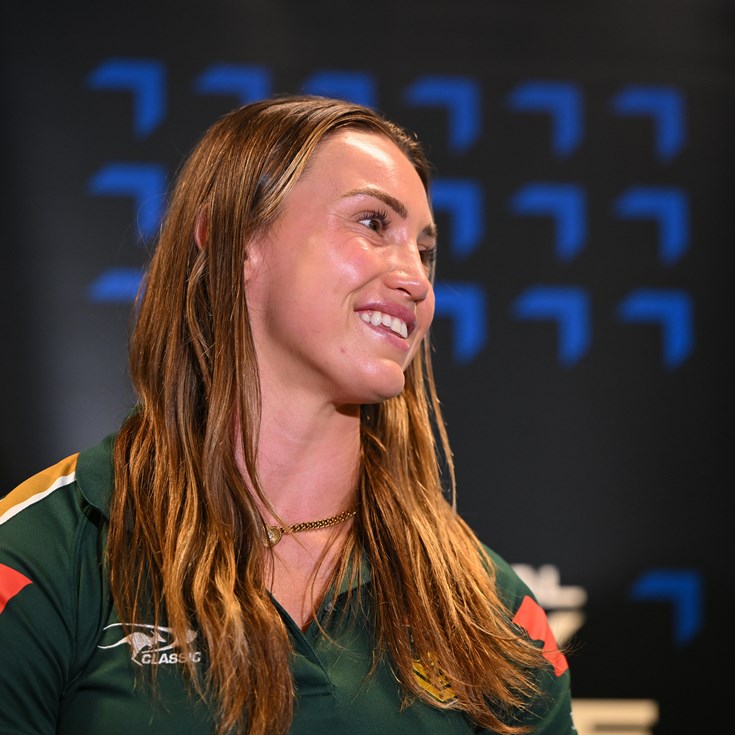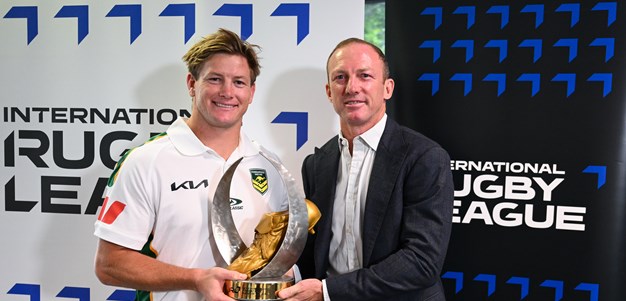

With a voice as husky as it was when he was a trusty Queensland Maroons warrior, Gary Larson has a simple explanation for the iron man durability he displayed in 24 consecutive State of Origin games.
"My attitude in every game I played in that Origin arena was that I didn’t want to let anyone down," Larson said.
"I was representing my family. I was representing my home town of Miriam Vale and I was representing my region of Central Queensland that I grew up in and played football in, and where I have an enormous amount of friends.
"I was representing all those people I had touched throughout my rugby league career."
For anyone who watched Larson ply his trade in the 1990s, that matter of fact and humble explanation of what drove him will come as no surprise.

His feat of playing 24 consecutive games for the Maroons from 1991 until 1998 remained a Origin record until surpassed by Johnathan Thurston in 2013.
Larson has a chuckle when asked about his tough as teak resilience to not miss any matches.
"I came close. I got knocked out and didn’t finish a few," Larson grinned.
"I guess that is the way it goes, but I started them all.
"I was there when Johnathan Thurston passed [the record] after Mal Meninga and the team management invited me down. He was more than worthy. It would have been Cameron Smith if he hadn’t been injured for one game but Johnathan was right up his clacker."
Larson's first Origin series for the Maroons in 1991 also happened to be Wally Lewis's last.
"That made it all the more special. It was the first time I had played with and been around The King after I’d watched him play the first State of Origin as a 13-year-old," Larson recalled.
"It was enormous for me. In my first series I played alongside players that I had always respected as Queensland legends like Bob Lindner, Gary Belcher, Mal Meninga, Mick Hancock, Gary Coyne… Steve Walters.
"I can remember a lot more about my childhood than I can about rugby league games. I copped a few head knocks but I don’t have any memory loss. It is just that when people ask me what happened in individual games, I have no recollection of it.
"I think it is because it all happened so bloody quick, but in the 1995 series I remember everything that happened off the field."
On the field Larson was a tower of strength for the Maroons and won the Ron McAuliffe Medal for best Queensland player of the series. With Paul coach Paul Vautin at the helm and team manager Chris Close as his trusty lieutenant the side bonded in an extraordinary way to defeat the more fancied NSW outfit 3-0.

"It was during the Super League war and Fatty and Choppy Close turned that team into a competitive bunch of players," Larson said.
"We went in with the attitude of giving it our all and playing for each other. It was about being in each other’s pockets 24/7. On the field if the ball went one way we were following it and there was no way they were getting through that chain of players, which is what we were."
Off the field the group enjoyed each other’s company.
"Around every corner there was a prank being played," Larson chuckled.
"Every door you walked past at the Travelodge that we stayed… you’d expect something to come flying out of the door. It was just a prankathon and great times.
"If it wasn’t Choppy Close it would be Tosser Turner or Jimmy Banaghan… or it might be Craig Teevan or Jason Smith. We were all up to our eyeballs at playing tricks on each other.
"Fatty was great at getting a simple message across, and we went out and did it. His main focus was defence and we defended very well as a group.
"We had some classy ball players in Smithy, Adrian Lam and Craig Teevan. Gavin Allen and Tony Hearn up front could offload balls, but it was all based around defence."
Larson was right at home with fellow North Sydney Bears such as Hearn, Ben Ikin, Brett Dallas and his close mate Billy Moore.
"Everyone in that team had come through the Queensland system and knew how to rise to the occasion,” Larson said.
Larson finished his Origin career with a series win in 1998, just as he had started it.
"That 1998 series was also special because I had always wanted to play under Wayne Bennett and that was the only chance I got,” Larson said.
"I learned a lot about myself and footy. It was a good series having all the Super League boys back, and winning of course after we hadn’t won one since 1995. I was just glad I did it on the way out.
"I was getting a little bit stale and Wayne taught me simple things, just about what an honour it was to play at that level and to do your very best every minute of the game."
Larson had started his career for Queensland at lock and finished it alongside Shane Webcke in the front row.

"My game didn’t change that much,” Larson said.
"I came off the back fence as much as I could and took the ball forward. I learned a few different tricks in the front row – setting up the foundations for a set of six and just hanging on in the middle. I enjoyed it."
Larson pulled the pin on his Origin career in 1999 after the rigours of backing up from playing rep football took its toll on his knees.
"The club was paying my bills and I was 31. It was enough and to go out on a winning note I thought was the way to go,” Larson said.
Larson still speaks with a trademark gravelly voice, courtesy of a stray elbow to the throat in a clash with Newcastle in the early 1990s.
"As a result my cartilage is collapsed at the base of one of the two vocal chords,” Larson said.
"I haven’t worried about having any surgery and I haven’t, touch wood, had too many problems with it. I keep getting it checked every 12 months and I will have it checked again soon.
"I don’t remember what I sound like normally. My kids don’t know me any other way."
Larson returned to Central Queensland at the end of his football career and still lives and works in the region he calls home.
"I am a production operator and work on bulldozers and loaders at the Gladstone Port Authority… stockpiling coal, loading ships and unloading trains," Larson said.
Larson attended Rockhampton Grammar School and played centre in the Australian Schoolboys rugby union side when Ricky Stuart was the halfback.
"There weren’t too many offers from rugby union coming my way when I left school. If I had of gone to university in Brisbane maybe there would have but I stayed here and got a trade and played league again," Larson said.
"That’s where it all started for me."



